
The Hepialidae are a family of insects in the lepidopteran order. Moths of this family are often referred to as swift moths or ghost moths.
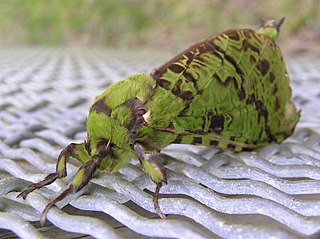
Aenetus is a genus of moths of the family Hepialidae. There are 24 described species found in Indonesia, New Guinea, New Caledonia, Australia and New Zealand. Most species have green or blue forewings and reddish hindwings, but some are predominantly brown or white. The larvae feed in the trunks of living trees, burrowing horizontally into the trunk, then vertically down.
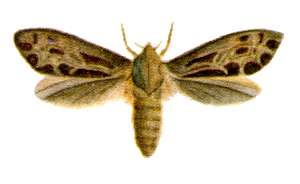
Oncopera is a genus of moths of the family Hepialidae. There are 12 described species, all endemic to Australia. The larvae usually feed on grasses, although that of O. intricata has been recorded on strawberry.

Macaria brunneata, the Rannoch looper, is a moth of the family Geometridae. The species was first described by Carl Peter Thunberg in 1784. It is found in Siberia, Japan, and northern and mountainous parts of North America, and throughout Europe, though in Britain it is largely or entirely restricted to mature forests in central Scotland.

The Tasmanian grassgrub or corbie is a moth of the family Hepialidae. It is found in Tasmania.
Macaria is a genus of moths in the family Geometridae first described by John Curtis in 1826. It is sometimes placed as a synonym of Semiothisa. Species are cosmopolitan.
Oncopera alboguttata is a moth of the family Hepialidae. It is found in New South Wales and Queensland.
Oncopera epargyra is a moth of the family Hepialidae. It is endemic to Queensland.
Oncopera alpina is a moth of the family Hepialidae. It is found in the Australian Capital Territory, New South Wales and Victoria.
Oncopera brachyphylla is a moth of the family Hepialidae. It is found in Queensland, Australia.
Oncopera fasciculatus, the underground grassgrub, is a moth of the family Hepialidae endemic to South Australia and Victoria. The fore wings are brown with a pattern of dark splotches. The hind wings are plain brown. The larvae live in vertical tunnels in the soil. They emerge at night to feed on the leaves of grasses in native and sown pastures.
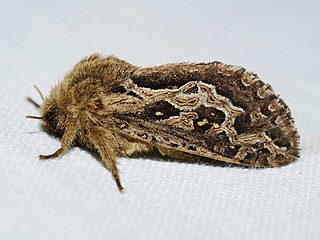
Oncopera intricoides is a moth of the family Hepialidae. It is endemic to Victoria.
Oncopera mitocera is a moth of the family Hepialidae. It is found in Queensland, Australia.
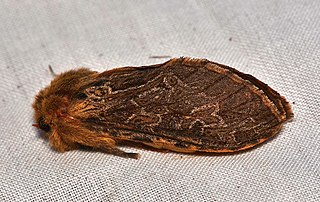
Oncopera rufobrunnea is a moth of the family Hepialidae. It is endemic to the Australian Capital Territory, New South Wales, Tasmania and Victoria.
Oncopera tindalei is a moth of the family Hepialidae. It is found in New South Wales, Australia. It was named after Australian entomologist Norman Tindale.
Eupithecia brunneata is a moth in the family Geometridae. It is found in Turkey.
Philenora brunneata is a moth in the subfamily Arctiinae. It was described by Franz Daniel in 1965. It is found in Afghanistan.

Speranza is a genus of moths in the family Geometridae erected by John Curtis in 1828.
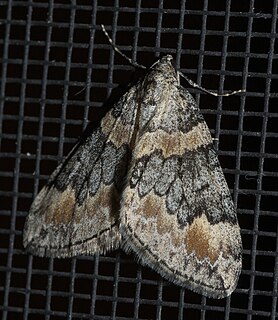
Dysstroma brunneata is a species of geometrid moth in the family Geometridae. It is found in North America.








